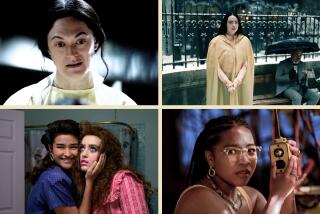‘Pride and Prejudice and Zombies’ by Seth Grahame-Smith
- Share via
Fiercely independent Elizabeth Bennet is known for her sharp tongue -- and her sharp dagger.
That’s what it takes to capture Darcy’s heart in “Pride and Prejudice and Zombies,” the surprising literary hybrid by Los Angeles author and screenwriter Seth Grahame-Smith.
While retaining 85% of the original text of Jane Austen’s “Pride and Prejudice,” this novel-as-mashup alters some characters’ fates and endows the Bennet sisters with martial arts skills to battle the lumbering undead.
“The people in Austen’s books are kind of like zombies,” Grahame-Smith said this week, as he tried to relax on a sunny patio and not think about the Amazon.com numbers. (As of Thursday, a day after its release, “Pride and Prejudice and Zombies” was ranked No. 10 on the site.) “No matter what’s going on around them in the world, they live in this bubble of privilege. The same thing is true of the people in this book, although it’s much more absurd.”
In Grahame-Smith’s version of the story, England has been beset by a decades-long zombie plague. London, under strict rule, is a walled city, and the militia is camped out in the countryside to take on the “manky dreadfuls” that crawl from the earth after every rain.
“Subconsciously, Austen was writing a horror novel and didn’t know it,” Grahame-Smith said. “People taking these strolls, riding their carriages to and fro. . . . There are so many opportunities there -- for zombie attacks.”
As only makes sense for such a hybrid project, the genesis of the novel was a mashup in its own right. Grahame-Smith’s publisher, Philadelphia-based Quirk Books, handed him the title and a very short deadline. He started by carefully mapping out where zombies might fit -- “you kill somebody off in Chapter 7, it has repercussions in Chapter 56,” he explained.
He pasted the original text into a document on his computer, then, using a second color, began adding zombie elements. Periodically, he would zoom out to assess the balance between the Austen and zombie parts.
Of course, the zombie text was red.
Even before publication, “Pride and Prejudice and Zombies” was discovered by bloggers and others on the Internet who focused on both the cover -- which features a Regency portrait by Sir William Beechey that was zombified by Quirk Books artist Doogie Horner, in which a young woman turns toward the reader, her lower face eroded, exposing a bony jaw and vicious, skeletal teeth -- and the opening line: “It is a truth universally acknowledged that a zombie in possession of brains must be in want of more brains.”
From there, news spread to the mainstream media.
In February, the Times of London wrote a piece about Hollywood’s bidding war over the book -- more of a “bidding skirmish” at that point, Grahame-Smith admits -- which became a self-fulfilling prophecy. Rumors, spread on the Internet and even in Quirk’s publicity materials, suggest that Natalie Portman has signed to star. The film rights are owned by the publisher, not by Grahame-Smith. If he knows anything, he’s not spilling.
And yet, film remains a touch point for the author. His earlier books -- all humorous nonfiction -- include 2007’s “How to Survive a Horror Movie.” He describes the zombies in his Austen remix as “the George Romero zombies of the 1960s and 1970s. The slow-moving, limb-dragging, single-minded creatures that care only about infecting others and biting brains.”
Of course, the juxtaposition of the careful manners of the Regency period with brain-eating zombies is silly and a little thrilling, making for a frisson that lasts throughout the book. Still, when one of the characters is affected by the zombie plague, it’s both grotesque and surprisingly affecting.
Without giving away too much, let me reassure you: It’s not Darcy. That would be unforgivable.
So far, Austen fans have been remarkably open-minded. “I was struck by the author’s facility with period language and style and how he uses it to comic advantage,” says Laurie Viera Rigler, author of the novel “Confessions of a Jane Austen Addict.” “Especially the euphemistic way in which the gentle folk refer to zombies as ‘unmentionables.’ I’ll bet Jane Austen herself would be amused.”
Less forgiving may be horror fans. “Pride and Prejudice and Zombies” is a little slow to deliver its zombie mayhem, and there’s a big, distracting helping of ninja combat. To novelist Cory Doctorow, the problem is simple: “[T]oo much Jane Austen,” he wrote on BoingBoing, “and not enough zombies.”
Grahame-Smith understands that point of view. When he first read Austen’s classic, as a freshmen at Bethel High in Connecticut, he was equally put off. “I did not really give a damn about Elizabeth Bennet and her man troubles, nor did I have a lot of fun with the run-on sentences and the heavy-duty language.”
But revisiting it later, the 32-year-old was struck by “how brilliantly constructed it is, how full the characters are, and most importantly, how sarcastic and even a little mean-spirited Austen was in tearing down the conventions that she disapproved of.” It felt appropriate to add humor -- sometimes frightening, sometimes gross, sometimes bawdy.
“Pride and Prejudice” is no stranger to reinterpretation. It has been adapted for film and television nine times under its own name, and reframed in “Bridget Jones’s Diary,” as well as a manga comic, an off-Broadway musical and the Bollywood “Bride and Prejudice.” Clearly, Austen’s tale of love and vanity continues to resonate. But do we need fresh approaches -- remixes -- to see the story new?
For his part, Grahame-Smith has no plans to build a classic-books-remix career. “I don’t know if I want to be the guy who writes ‘Pride and Prejudice and Zombies’ and then ‘Sense and Sensibility and Vampires,’ or ‘Wuthering Heights Reloaded,’ ” he says.
His new novel -- another horror-historical fiction hybrid -- will be original.
What if someone wants to rework that book as he has done to Austen’s?
“I would hope that if I ever wrote something that someone wanted to remix,” he says, laughing, “they would wait until after I was dead.”
. . . or undead.
Kellogg is lead blogger for Jacket Copy, The Times’ book blog.
More to Read
The biggest entertainment stories
Get our big stories about Hollywood, film, television, music, arts, culture and more right in your inbox as soon as they publish.
You may occasionally receive promotional content from the Los Angeles Times.











